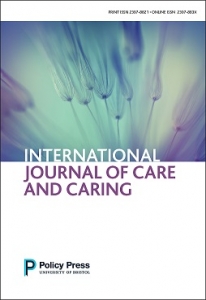In the UK, we use the language of social care for what in most other countries is called long-term care. This is support given to people due to age-related frailty, disability or mental health conditions. It encompasses support for activities of daily living, such as personal care and food preparation, and also broader access to work and community activities.
Working in collaboration with academics from Monash University’s Health and Social Care Unit, we noted the growing use of the language of social care in Australia, and together wrote about the origin and meaning of the term in the UK and Australia. In our Debate article for the International Journal of Care and Caring, co-authored by Birmingham and Monash academics – Heather Morris, Robin Miller, Darshini Ayton, Mandy O’Connor, Kelly Hall and Helen Skouteris –we explored the reasons for this usage, and in particular what the term social was doing in there.
In the UK, social care has developed from what used to be called social services, relating to what local government provided for people whose needs which were not encompassed by the NHS or social security. In the post-Second World War era, this support was particularly aimed at frail older people. Over time – due to campaigning by disability groups – it came to encompass support for disabled people, often in residential institutions. More recently, it has been extended to people with long-term mental health conditions, and to unpaid carers. In Australia, the term social care has been gaining traction since the early 2000s, in place of community services. Usually it is used in conjunction with health (as in ‘health and social care’) and partly reflects the influence of UK models in reshaping services.
Social care in both countries is social in the sense of being public in that some of it is paid for out of taxation. Elder care in both countries is means-tested, and people can only access state support if their assets fall below a certain threshold. In the UK, the means-test threshold has not changed since 2010, and with high rates of inflation is becoming ever less inclusive. This means that a lot of social care is provided by the private sector to private clients, with no state involvement. Disability support is not means-tested, although in both countries it is subject to stringent eligibility criteria which means that many disabled people are excluded.
Historically, social care was also social in the sense of being provided in congregate settings, such as residential homes. Increasingly this model of provision has been abandoned for working-age disabled people, and the threshold at which older people enter residential care has also been raised. For both disabled and older people most care is given at home. Nonetheless Lucy Series writes powerfully about how institutional mindsets can continue to prevail in both group homes and domestic settings.
Social care is also social in the sense of being about people’s capacity to lead social lives, to engage in their communities. It isn’t just about meeting people’s basic needs (‘up, washed and dressed’ as it’s sometimes described). It is about helping them to access family, friends, education and employment. Good social care is about assessing what makes a good life for someone, and how to help them access that – a means to an end, not an end in itself.
This sense of being social is the least developed. Rates of isolation and loneliness are high in both countries. As the social model of disability reminds us, society disables people by failing to make opportunities and spaces accessible. Education and employment facilities are not open to people in the way that they should be. People who want to employ a personal assistant to help them get to work face all kinds of barriers. Whatever social care is doing, it is not helping people to be social.
In our Debate piece, we explore whether to give up on the term social care altogether – why not just call it long-term care, coming into line with other countries? However, we conclude that we should aim to live up to the potential of the social rather than abandoning it. For too many people, social care meets their basic needs, but fails to give them the tools they need to live a ‘good life’ in communion with others. As #SocialCareFuture puts it, ‘we all want to live in the place we call home, with the people and things we love, in communities where we look out for each other, doing the things that matter to us’. So let’s lean into the social part of social care and ensure that people can draw on the resources of the state to support flourishing lives.
Catherine Needham is Professor of Public Policy and Public Management at the Health Services Management Centre, University of Birmingham. Her research focuses on social care (including care markets and systems).
 Social care: time for a name change? by Catherine Needham, Heather Morris, Robin Miller, Darshini Ayton, Mandy O’Connor, Kelly Hall, and Helen Skouteris is published in the International Journal of Care and Caring and is available on Bristol University Press Digital here.
Social care: time for a name change? by Catherine Needham, Heather Morris, Robin Miller, Darshini Ayton, Mandy O’Connor, Kelly Hall, and Helen Skouteris is published in the International Journal of Care and Caring and is available on Bristol University Press Digital here.
Bristol University Press/Policy Press newsletter subscribers receive a 25% discount – sign up here.
Follow Transforming Society so we can let you know when new articles publish.
The views and opinions expressed on this blog site are solely those of the original blog post authors and other contributors. These views and opinions do not necessarily represent those of the Policy Press and/or any/all contributors to this site.
Image: Africa Studio/Shutterstock.com


